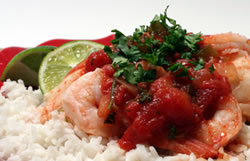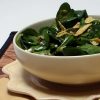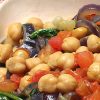Fish has a large role in any healthy diet, and seeking out bold new ways to prepare it is a great way to keep this simple, versatile food interesting. This week's recipe provides a fresh way to spice up an old favorite.
This recipe starts with that most basic kitchen staple: the onion. Although believed to have originated in Asia about 3500 BC, by the time onions made their way to ancient Greece, they were a hit. Greek athletes consumed large quantities because they believed it would "lighten the balance of the blood."
The word onion is commonly believed to come from the Latin word unio, which means large pearl. In English, this later became unyon. They became even more prominent after onion soup was made popular by Stanislaus I, the former king of Poland.
Onions provide vitamins C, and also contain vitamins B6, B1 and folic acid. But their more distinctive contribution is a family of antioxidants called allium compounds that have been linked in laboratory studies to a range of anti-cancer activities.
Onions pair well with the sweeter flavor of bell peppers. Although closely related to the jalapeno and other hot peppers, the cool, crisp bell pepper contains a recessive gene that eliminates capsaicin, the compound responsible for hotness. They do, however, contain the antioxidant vitamins C and A.
The most surprising ingredient of this week's recipe is the chile paste. A little goes a long way, and people tolerate spiciness differently, so we've kept the amount in the recipe below very modest. Feel free to experiment to create just the right level of heat for you.
The addition of San Marzano tomatoes - thinner and pointier than the more familiar Roma variety - complements the onions and bell peppers. This variety of plum tomato is considered by many chefs to be the best sauce tomato in the world.
According to popular lore, the first seed of the San Marzano tomato came to Italy in 1770 as a gift from Peru to Naples. They were first grown in the volcanic soil that is believed to act as a filter for water impurities. The San Marzano's flesh is much thicker than the Roma, with fewer seeds. It's flavor is likewise stronger, sweeter, and less acidic.
Halibut, one of the most versatile fish you can cook, is perfect for this recipe, as it is mildly flavored and takes on the character of its surrounding ingredients. You may, however, choose to substitute cod, which is similarly moist and flakey when cooked.
Topping the fish with shrimp enhances the delectable seafood flavor. This recipe also works well for those who prefer to skip this ingredient. So enjoy the taste of Brazil and personalize this recipe by experimenting with both the chile paste and the topping to create your own version.
Brazilian-Style Baked Fish
Makes 6 servings.
Ingredients
- 3 Tbsp. olive oil, divided
- 1 medium onion, chopped
- 1/4 cup green bell pepper, chopped
- 2 cloves garlic, minced
- 1/2 tsp. chile paste (more or less can be used, depending on how spicy you want it)
- 1 can (28 oz.) San Marzano tomatoes
- 3 Tbsp. parsley, chopped
- 2 Tbsp. cilantro, chopped
- 1/2 tsp. salt
- 1/4 tsp. pepper
- 1-1/2 lb. halibut or cod fillets, about 1/2 inches thick
- 1/2 lb. medium size raw shrimp, shelled and deveined
- 3 Tbsp. lime juice Lime wedges for garnish
Directions
- Preheat oven to 400 degrees.
- Heat 2 Tbsp. oil in skillet over medium heat. Add the onion, green peppers and garlic. Saute until onion is translucent. Add chile paste and tomatoes (break with a fork).
- Simmer, uncovered, for 20 minutes or until thickened. Add parsley and cilantro. Mix lightly to combine.
- Season fish and shrimp with salt and pepper. Pour tomato mixture into a shallow 2 quart baking dish. Arrange fish on sauce. Top with shrimp. Drizzle with remaining 1 Tbsp. oil and lime juice. Cover pan with parchment paper then foil. (Aluminum and tomatoes do not mix.)
- Bake for 30 to 35 minutes or until fish flakes easily. Serve fish on a platter with sauce spooned on top. Serve with rice and lime wedges.
Nutritional Information Per Serving:
320 calories
10 g total fat
1.5 g saturated fat
23 g carbohydrate
33 g protein
3 g dietary fiber
560 mg sodium
Diabetic Exchanges: 3-1/2 Lean Meat, 4 Vegetable
AICR










